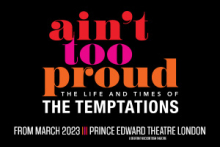”Ain’t Too Proud” review – get ready, The Temptations are rollin’ into the West End

© Johan Persson
Where Jersey Boys had four narrators and four leading roles, the storytelling in Ain’t Too Proud falls to the sole surviving member of the original Temptations line-up, Otis Williams (played with a wonderful mixture of gravitas and relatability by Sifiso Mazibuko), and a whole bunch of principal roles, reflecting the fact that over the years the group has had more than two dozen members.
Dominique Morisseau’s book is based on a published memoir by Williams and Patricia Rowmanowski, and is a considerable cut above the scripts for many other jukebox shows. There’s a keen wit at play here, often at the expense of the apparently revolving door policy for membership to the group. There is also a willingness to engage with some of the less savoury aspects of the band’s story (drug abuse, illness, volatile domestic relationships) without trivialising or sensationalising, and there’s heartfelt acknowledgement of significant political events such as the Detroit civil rights protests in the summer of 1963, and the assassination of Martin Luther King, and it talks about race with sanguine intelligence.
Those songs still have the ability to thrill the blood: “Papa Was A Rollin Stone”, “My Girl”, “Get Ready”, “Shout”, “Just My Imagination”, a soaring, poignant “What Becomes of the Broken Hearted” finale…they’re all here, sounding terrific and surging joyfully through the Prince Edward Theatre, evoking memories and possibly converting new fans. The sound design (Steve Canyon Kennedy) is unusually good, allowing us to appreciate the complex, immaculately delivered harmonies, and Howard Wheeler’s sparkling but meaty orchestrations. Too often rock and pop musicals crank up the volume to levels that seem more likely to induce physical discomfort rather than enjoyment, but that’s not the case here.
McAnuff’s direction has cinematic sweep and a predominantly duo-chromatic colour palette throughout Robert Brill’s set and Peter Nigrini’s frequently dazzling projection design. The overriding visual impression is of stylish black and white stage pictures with occasional and highly effective splashes of colour provided by Howell Binkley’s lighting or Paul Tazewell’s costumes. Technically, it’s a complex show that’s always on the move but it’s so skilfully staged that it’s never unclear where the focus is.
That focus is frequently on Sergio Trujillo’s exciting, period-specific choreography, by turns aggressive then smooth, always dynamic, as performed by a cracking company who always, crucially, feel like human beings rather than slickly drilled automatons. The voices are spectacularly good throughout.
Mazibuko’s innate warmth is a lovely centre to the show, and every other member of The Temptations line-up makes a strong impression: Kyle Cox creates something haunting out of one of the most troubled of the originals, Cameron Bernard-Jones brings the house down with his glorious deep bass, Mitchell Zhangazha intriguingly invests one of the break-out stars with baby-faced charm and a growing sense of discontentment, and Michael James Stewart brings explosive energy to a vocalist let go from the fold early in the story.
The other Temptation that escaped to forge a solo career before returning later was David Ruffin, who would eventually crash and burn tragically. He’s described by Otis as “lightning in a bottle” which is exactly what Tosh Wanogho-Maud delivers in a barnstorming, stage-igniting turn. He’s such a sensation that he’s sorely missed whenever he’s not on stage, which proves slightly problematic for long swathes of the second half. A stand-out in 2021’s The Drifters Girl, he’s absolutely astounding here.
Posi Morakinyo and Akdem Junior Khemalah are magnetic presences as a later Temptation and Motown boss Berry Gordy respectively. Sadie-Jane Shirley lends serious glamour and sass as a ball-breaking manager and Naomi Katiyo delivers a genuinely affecting version of “If You Don’t Know Me By Now” as Otis’s first love who was the mother of his child but found herself unable to wait for him while he was out on the road.
I suppose ultimately one could argue that Ain’t Too Proud does only what it says on the tin. That’s fine, as long as that tin promises slickly produced, uplifting popular entertainment filled with unforgettable soul and R’n’B classics, gleaming spectacle and rousing performances. It’s also notable in that large-scale, expensively produced mainstream extravaganzas celebrating Black achievements and scripted by a Black woman are still, Tina and MJ aside, pretty rare. Here’s one that is a couple of hours of unalloyed pleasure, and that deserves to be a great big fat popular hit.
















